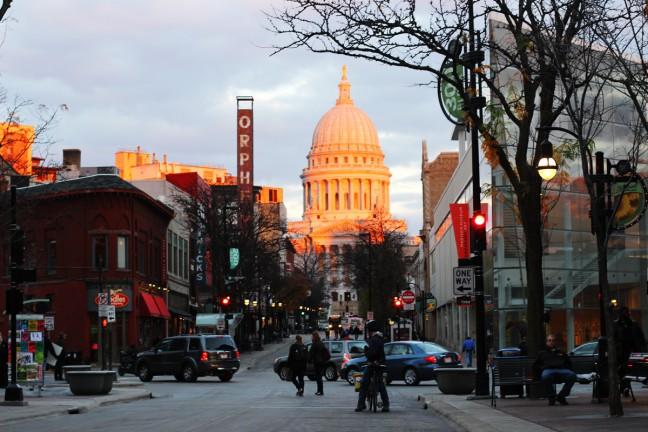Ahead of upcoming elections for state and federal offices, poll results from the Marquette University Law School highlighted favorability ratings for key candidates up-and-down the ballot and detailed statewide opinions on major, hot-button issues.
According to the poll, Gov. Scott Walker’s approval rating rose two percent from last year’s poll, climbing to 47 percent. His disapproval rating is equivalent to his approval numbers and is down one percent from last year’s poll. Walker faces an expansive field of Democratic Party candidates for the governorship in this year’s election.
Among Walker’s challengers, State Education Superintendent Tony Evers had the highest favorability rating, falling at 20 percent. Other candidates with high favorability ratings included former Wisconsin Democratic Party Chair Matt Flynn, Madison Mayor Paul Soglin and Sen. Kathleen Vinehout, D-Alma.
If the election for the Democratic gubernatorial candidate was held today, the survey responses showed Evers would enjoy the most support, with 18 percent of the vote — nine percent higher than his closest rival Soglin. Forty-four percent of respondents, however, said they do not know who they would vote for out of the field of candidates.
In another election, the candidates for the officially nonpartisan state Supreme Court race were recently narrowed to two individuals — Rebecca Dallet, widely perceived as the Democratic Party’s choice, and Michael Screnock, the Republican favorite.
At nine percent, Dallet and Screnock have identical unfavorability levels. While more than half of the survey respondents said they did not know enough about either candidate to form an opinion, Dallet’s favorability rating of 14 percent fell four percent higher than Screnock’s.
While not up for reelection this year, President Donald Trump’s approval rating was also measured in the survey. The poll found his approval rate to be at 43 percent, while his disapproval rate climbed seven points higher to 50 percent.
The poll also found Republican voters to be less enthusiastic going into the 2018 elections than Democratic voters. This data point potentially holds significance. The last time its voters were measured as more enthusiastic than Democratic voters, the Republican Party took control of the U.S. Senate and grew its already significant control of the U.S. House.
Expanding beyond election numbers, the poll also measured Wisconsinites’ attitudes toward gun control and regulation — a particularly relevant datapoint following intense national discussion after a recent mass shooting at a Florida high school.
The survey found 81 percent of respondents supported background checks on private gun sales at gun shows, while 16 percent oppose them. Additionally, 54 percent supported banning assault rifles, compared to the 43 percent who oppose such a ban. Overall, individuals who said they owned a gun were less likely to support greater gun control regulations than individuals who said they did not.
The survey also tested people’s attitudes toward the Foxconn deal, in which the Taiwanese technology giant received billions in tax credits and investment from the state in exchange for a large factory in the Racine County village of Mount Pleasant.
The poll separated respondents into five geographical areas of Wisconsin — the city of Milwaukee, the greater Milwaukee area, Madison, Green Bay and north/west Wisconsin. With the exception of the greater Milwaukee area, most respondents in each geographical region believed the Foxconn deal was not worth the investment it received from the state.
Additionally, most respondents in all areas of the state believed local businesses would not benefit from the deal. But with the exception of the City of Milwaukee, most survey respondents in every area of the state believed the deal would benefit the local economy.
In another hot-button issue, the poll measured attitudes toward immigration. In light of Trump’s campaign rhetoric and his recent termination of the Deferred Action for Childhood Arrivals program, there has been extensive discussion and debate about immigration throughout the country in recent months.
The poll found 71 percent of those surveyed believed there should be a path-to-citizenship for illegal immigrants already in the country. 14 percent, however, believed these individuals should stay only as temporary guest workers and 9 percent believed they should be required to leave the United States.
This was the first Marquette University Law Poll of 2018. The same poll has historically been completed again in June — a significant date this year, as it falls even closer to the August primary and November general elections.


